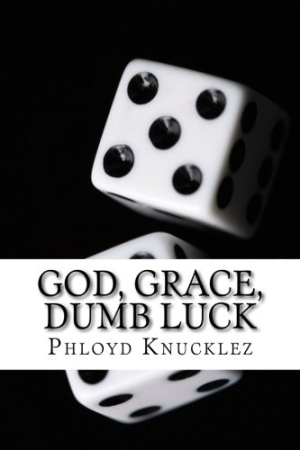God, Grace, Dumb Luck
These poems are an unflinching deep dive into the modern American experiment.
In God, Grace, Dumb Luck, Phloyd Knucklez uses experimental verse and alternating personae to probe the pedestrian darkness of contemporary America. Grounded in vernacular language and blue-collar experiences, Knucklez’s work pits the idiosyncratic particulars of modern American life against greater existential questions and offers a brazen, narcissistic nihilism as a defense against the indefensible.
The book combines forms from prose, poetry, and playwriting. Most often, Knucklez’s pocket is long-line verse, where his rhythms unspool like Kerouac writing prose poems or Ginsberg writing flash fiction.
Although the point of view shifts as often as the form, the sense of authorial voice—in word choice, syntax, and prosody—unifies the book, giving it coherence and narrative perspective across individual poems. Every entry reads like raw, unfiltered truth, almost biographical in its unpracticedness. The seeming effortlessness of the language betrays admirable skill and artistry.
Knucklez’s strength is detail: the sometimes ridiculous particulars and minutiae that make up our lives. In “Preferring Form To Truth,” the speaker relates a fight with a girlfriend where he burned her favorite blouse; she “threw a frozen pork chop / at me and knocked out two of my teeth.” Knucklez deploys this same attentiveness to language in his various uses of mass media, corporate, religious, and pop culture buzzwords to create an impenetrable wall of language that divides the “us” from “them.” Often, the “us” side of the equation speaks in the vernaculars of the street, of Yiddish-speaking Jews, of blue-collar twentieth-century immigrant heritage, and of adult children, dislocated and spiraling in America’s invisible class system.
In particular, many poems’ first-person speaker, a man in his mid-to-late forties, ranges from an impotent and passive accessory in his own life to a raging, incisive interlocutor, distanced from the masses and defended by his knowing, coolness, and narcissism. Somewhere between these two extremes exist the book’s everyday crises and an existential paralysis that notes,
Things happen for a reason, she reasons,
the reason may be a test;
for which there is no time to study,
no bell curve, no retakes and no passing grade.
Faced with this knowledge, most often, Knucklez’s speakers stall out and inevitably fail, as in “That Pale No Hoper,” where the speaker studied for “the paramedic licensing exam, the postal exam, the firefighter’s exam, the police officer exam, the civil service exam, the telephone company exam, even the armed services vocational aptitude battery, and failed them all.”
Nonetheless, these speakers persist, and their lives are lived out amidst “the biggest / myth in the history of myths. // The myth that if you get hurt, you crawl off the field. // If you can’t crawl off the field, somebody will come get you.”
Knucklez’s experimental verse is a deep dive into the modern American experiment. In language and topic, Knucklez is consistently unflinching, offering discomforting images of all the places, both psychological and geographical, where people wait in vain “for some other kind of refuge.”
Reviewed by
Letitia Montgomery-Rodgers
Disclosure: This article is not an endorsement, but a review. The publisher of this book provided free copies of the book and paid a small fee to have their book reviewed by a professional reviewer. Foreword Reviews and Clarion Reviews make no guarantee that the publisher will receive a positive review. Foreword Magazine, Inc. is disclosing this in accordance with the Federal Trade Commission’s 16 CFR, Part 255.

